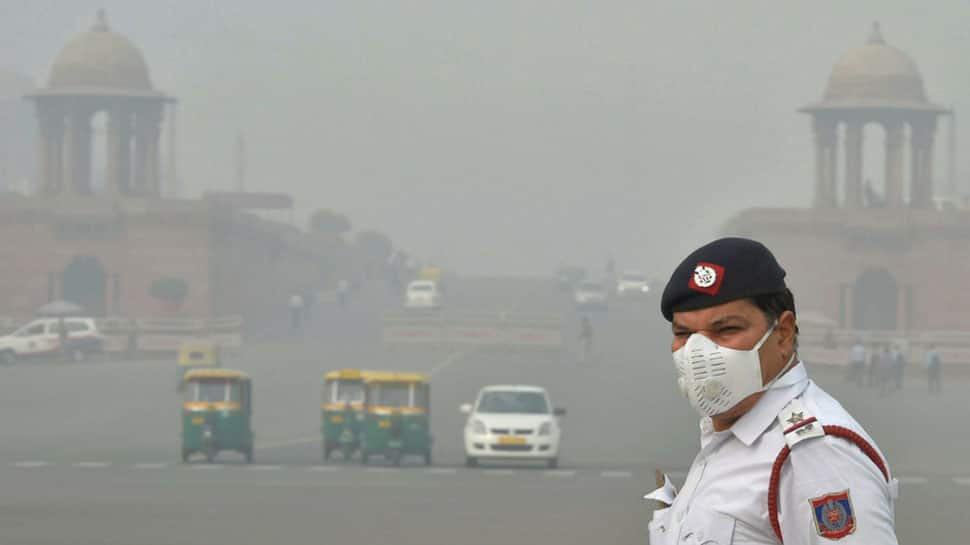NEW DELHI: Delhi's air quality remained in the "very poor" category on Wednesday, with four areas recording "severe" pollution levels even as the Cental Pollution Control Board (CPCB) directed agencies to join social media to help citizens lodge complaints directly.
Pollution watchdog CPCB also noted that actions of the public and enforcement bodies have been "inadequate" in curbing pollution.
With no clarity on undertaking of cloud seeding to induce artificial rain in the national capital, scientists at IIT Kanpur said they had made all preparations, including procurement of aircraft from the ISRO, to conduct the same.
According to CPCB data, the overall air quality index (AQI) in the city was recorded at 373, which falls in the "very poor" category. Anand Vihar, Nehru Nagar, Mundka and Wazirpur recorded "severe" air quality, while 30 areas recorded "very poor" air quality, it said.
At 392, the overall air quality of Greater Noida was the worst in the National Capital Region (NCR), just points below the "severe" category. Gurgaon, Faridabad, Noida and Ghaziabad too recorded "very poor" overall air quality.
On Wednesday, the PM2.5 level (particles in the air with a diameter of less than 2.5 micrometre level) was recorded at 240, while the PM10 level was recorded at 389, the CPCB data said.
According to the Centre-run System of Air Quality and Weather Forecasting (SAFAR), air quality in the national capital is expected to remain in the "very poor" category in the next two to three days.
"At present, winds are unfavourable for dispersion which allows pollutants to accumulate. Humidity is still high which is unfavourable," the SAFAR said in its report, adding that fire counts from stubble burning has declined and will have a marginal impact.
Meanwhile, the CPCB directed public and enforcement agencies to immediately join social media platforms on which citizens can lodge their complaints on pollution directly, noting that actions of these bodies have been "inadequate".
The directions have been made to the NDMC, SDMC, EDMC, DMRC, CPWD, DDA and the state pollution control boards of Delhi, Rajasthan, Haryana, Punjab and Uttar Pradesh, among other public bodies.
In a meeting with public agencies and state pollution control boards, CPCB Member Secretary Prashant Gargava asked the agencies to join social media platforms like Twitter and Facebook to facilitate citizens lodging complaints of air polluting activities.
"It has been observed that most of the agencies are yet to join social media platforms and take action in respect of complaints concerning them," the CPCB was quoted as saying in the minutes of the meeting that took place last week.
The CPCB said the complaints reported were forwarded to the agencies concerned for action, however "it is observed that most of the agencies are yet to join and also action taken on complaints are inadequate".
"It was reiterated that agencies must immediately create Facebook page and Twitter handle to join CPCB social media platform to address complaints," it said, adding that the action taken in response must also be posted on the same platform through which complaints are received.
Gargava directed representatives of agencies to ensure effective corrective action in all cases of air polluting activities being reported through social media and the Sameer app that has been developed by the CPCB.
The move comes in the wake of Delhi battling alarming levels of pollution for over a month due to regional factors like stubble burning and localised factors like pollution from vehicles, firecrackers and construction activities, among others.
On Monday, the Supreme Court-appointed Environment Pollution Control Authority Chairperson Bhure Lal also lashed out at enforcement agencies, alleging that Delhi's civic and urban bodies are "not properly implementing" the directions issued to curb pollution.
Scientists at IIT Kanpur however said despite their preparations, they were not certain about when the cloud seeding could be done as they are waiting for meteorological conditions to fall into place.
"We have made all the preparations and have also got the aircraft from ISRO which will be needed to induce the artificial rain. The technique has been tested before in Maharashtra as well as parts of Lucknow. However, this is the first time in India that artificial rain would be created over a big land mass to counter the damage done by air pollutants," Manindra Agarwal, Deputy Director of IIT Kanpur, said.
Cloud seeding is the process of combining different kinds of chemical agents, including silver iodide, dry ice and even common salt, with existing clouds in an effort to thicken them and increase the chances of rainfall.
While IIT Kanpur is supporting the plan of the CPCB to induce artificial rain by providing the salt mix and other logistical support, a group of students at IIT Delhi are also helping the weathermen in monitoring conditions to become favourable for creating artificial rain.
In 2016, the government tried to explore the possibility of cloud seeding for artificial rain but the plan never worked out. China has been using cloud seeding to create rains for many years. The US, Israel, South Africa and Germany have also used the technology.
















